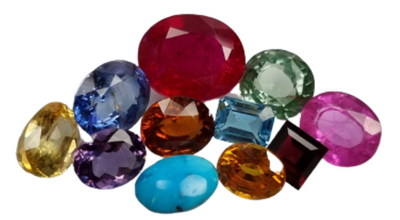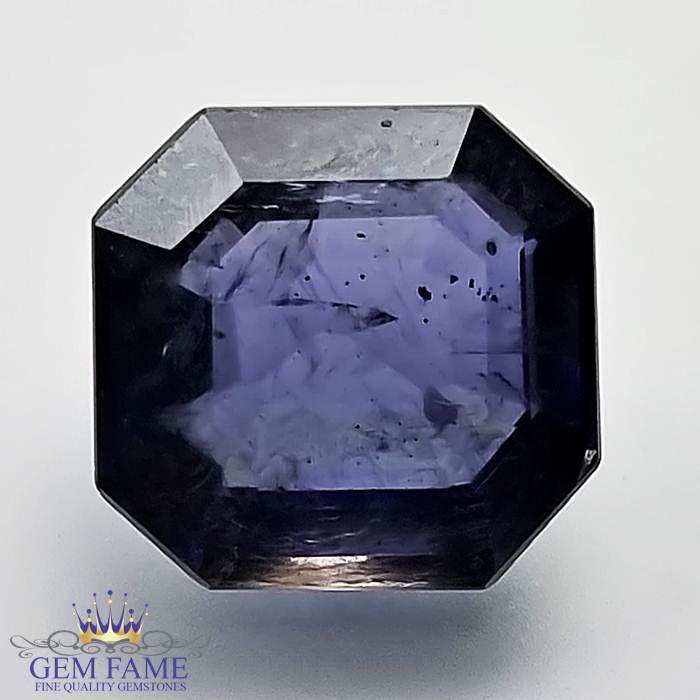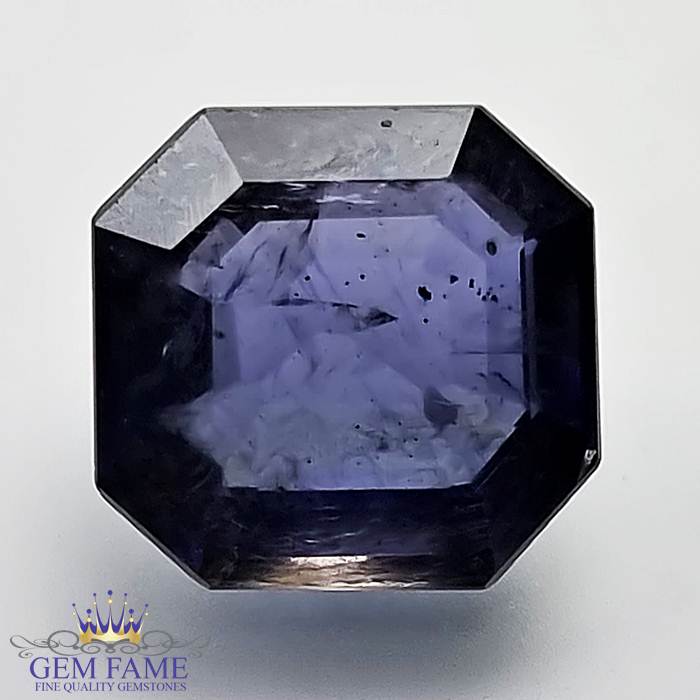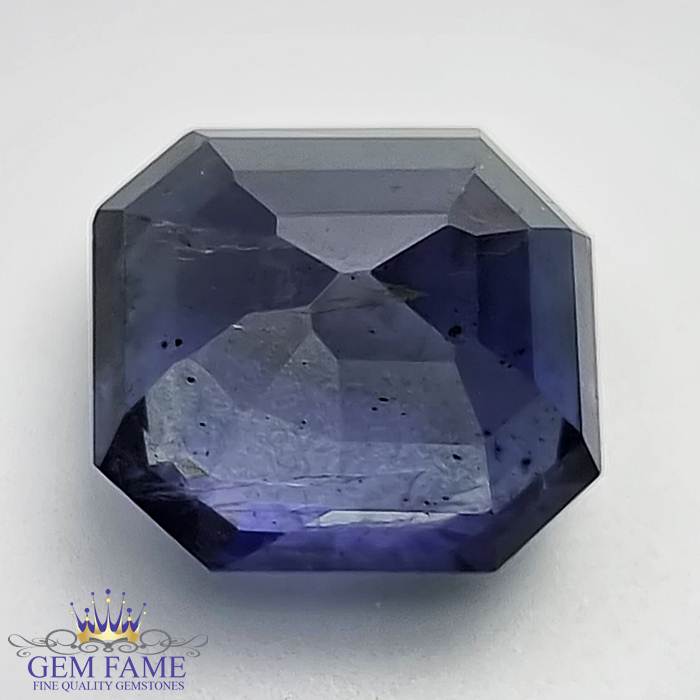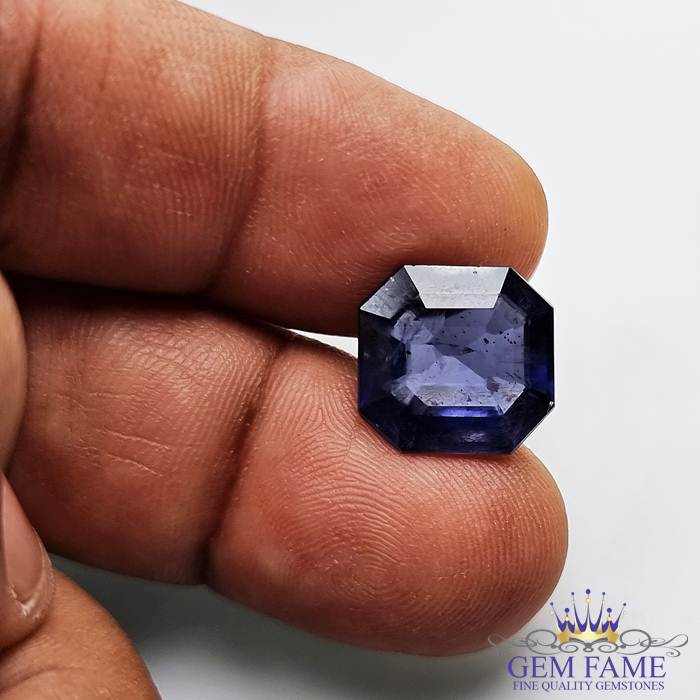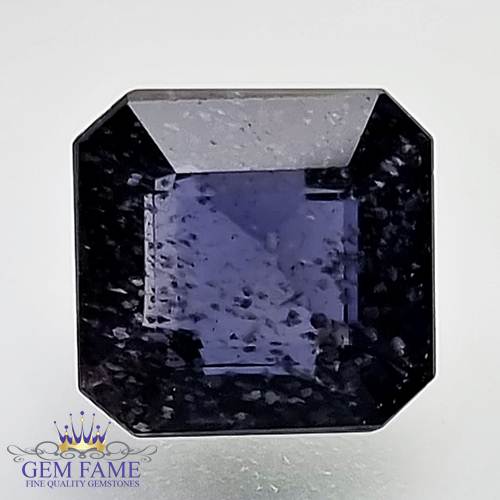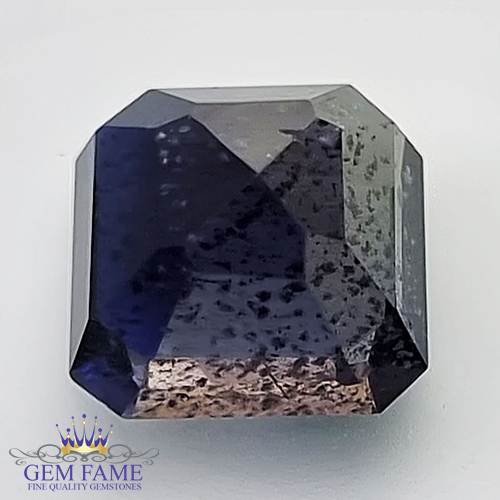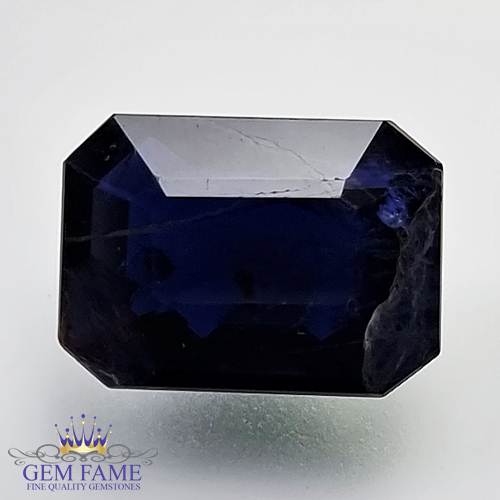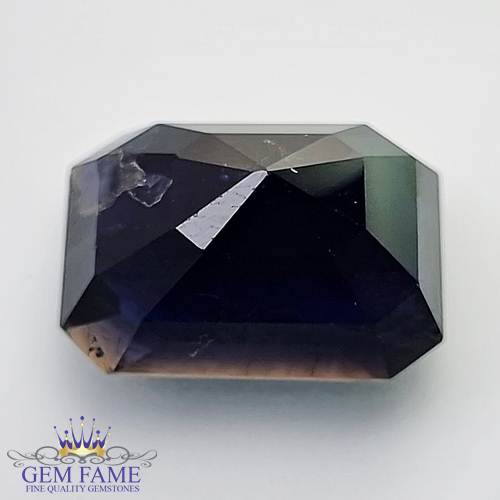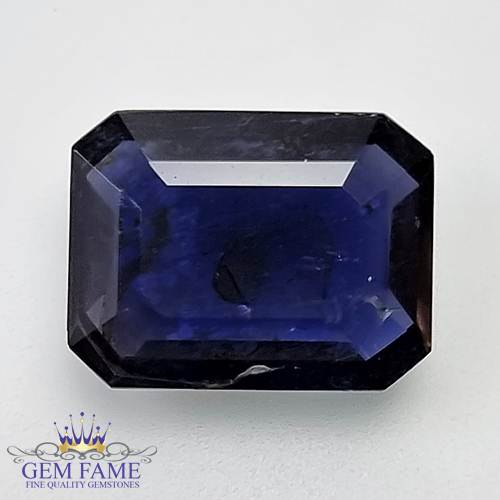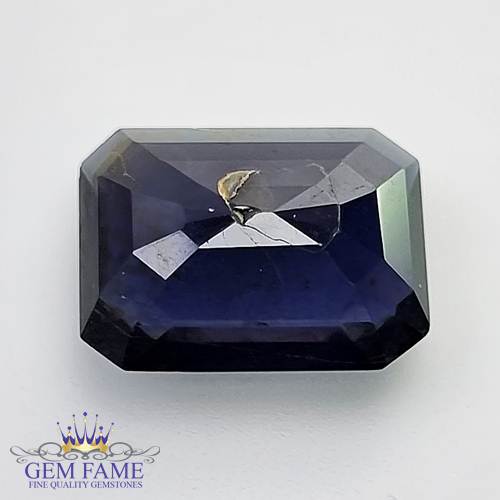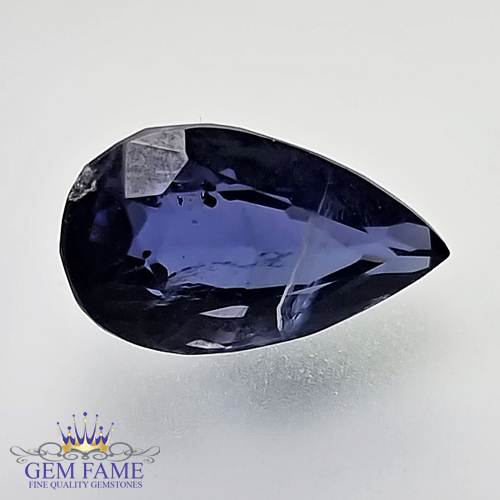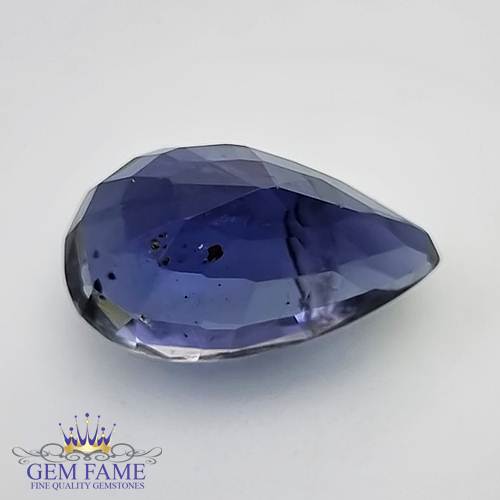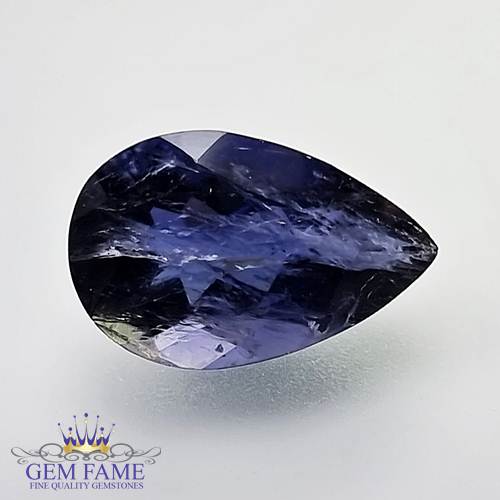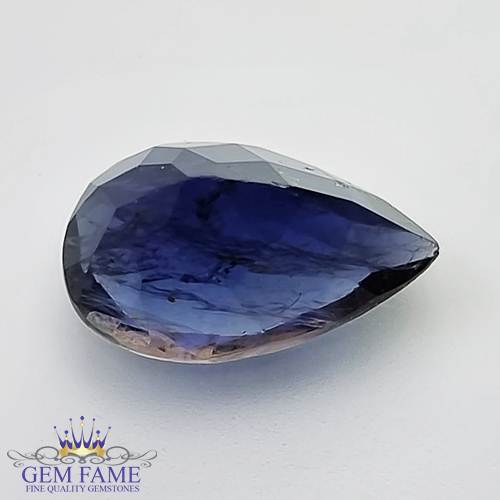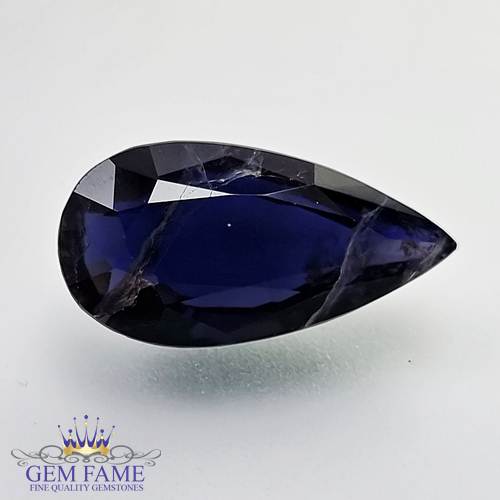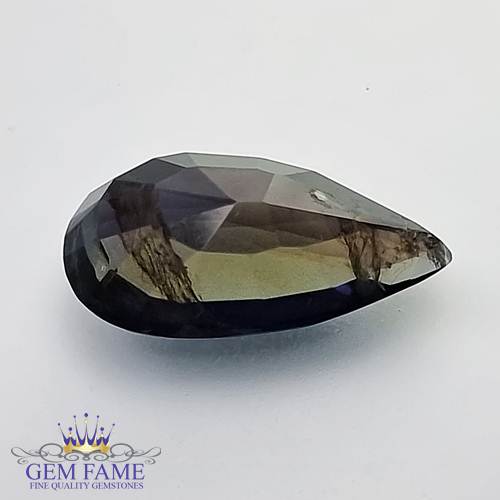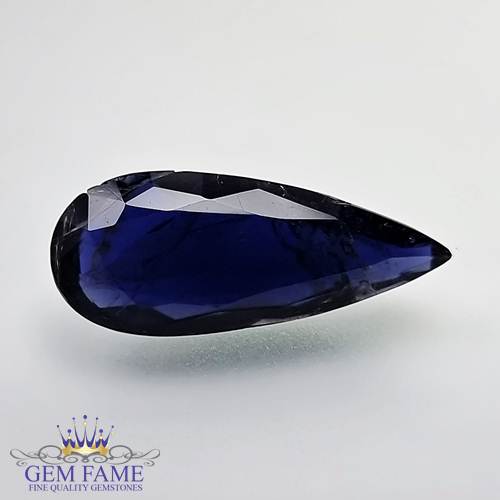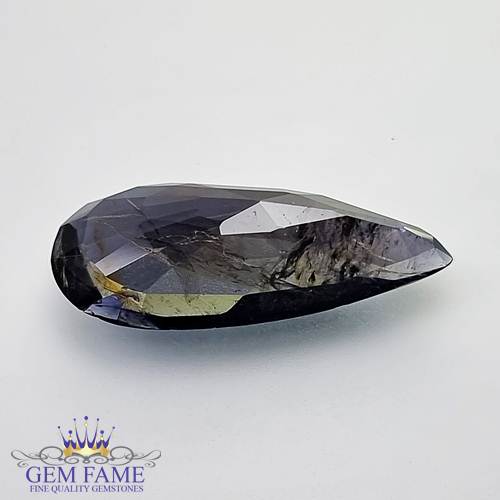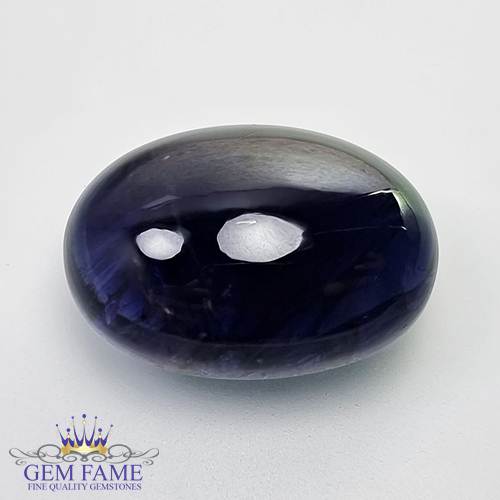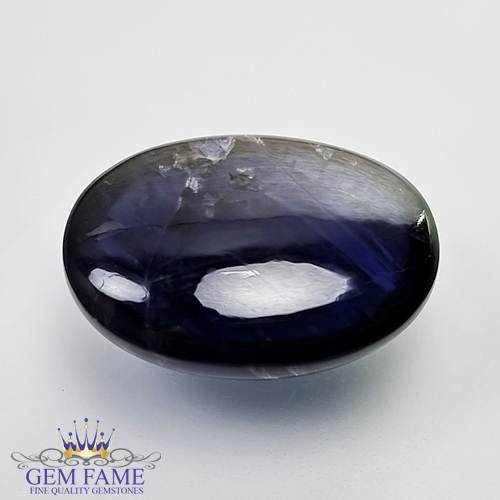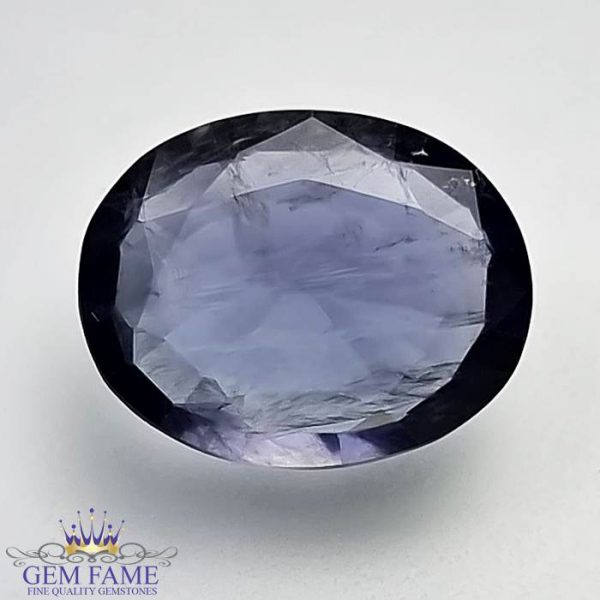
Iolite-Cordierite (Neeli) Gemstone 5.23ct India
122.40$ Original price was: 122.40$.94.16$Current price is: 94.16$.
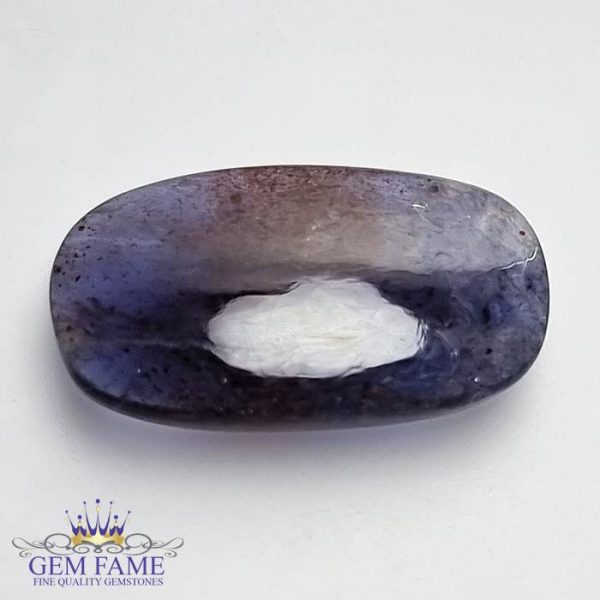
Iolite Sunstone 10.10ct Gemstone India
157.59$ Original price was: 157.59$.121.22$Current price is: 121.22$.
-23%
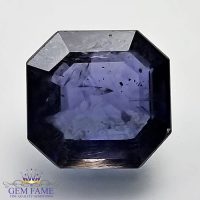
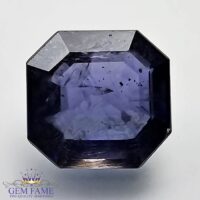
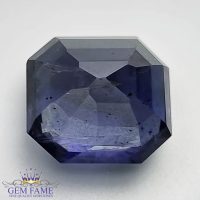
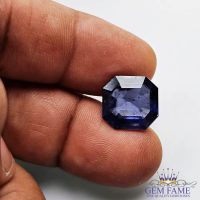
Iolite-Cordierite (Neeli) Gemstone 9.04ct India
282.09$ Original price was: 282.09$.216.99$Current price is: 216.99$.
SKU : AK00106
1 in stock
19
People watching this product now!
SKU:
AK00106
Categories: Iolite, Iolite Varieties
Description
Description
Iolite-Cordierite (Neeli) Gemstone Sale Online – India -9.04ct
Description
This Iolite-Cordierite (Neeli) is Gemstone Which is Blue Color, it’s Originates from India and it’s Exact Weight is 9.04ct, The Measurements are 12.90×12.70×6.80mm, The Shape and Cut of This Stone is Octagon Step Cut It’s Graded Transparent And Clarity is Excellent. This 9.04ct Iolite-Cordierite (Neeli) Gem is Available For Ready to Ship. You Can Also Select Certification And Shipment Method As Optional.
Details
| Summary No | AK00106 |
| Species | Natural Iolite Cordierite (Neeli) |
| Weight | 9.04ct |
| Shape/cut | Octagon Step Cut |
| Color | Blue |
| Dimension | 12.90×12.70×6.80mm |
| Clarity | Slightly Included |
| Transparency | Transparent |
| Origin | India |
| Treatment | None |
Iolite-Cordierite (Neeli) Gemstone 9.04ct
Properties Of Iolite
Chemical Composition: (Mg,Fe)2 Al4Si5O18 [Magnesium Aluminum Silicate]
Hardness: 7.0 – 7.5Moh
Specific Gravity (Density) : 2.60 – 2.66 (g/cm3)
Refractive Index : 1.527 – 1.578(DR) Biaxial ( – )
About: Iolite-Cordierite (Neeli) Gemstone
Cordierite is also called Iolite Cordierite (Neeli), Dichroite or even water sapphire due to its frequent sapphire blue colours. Although Iolite is the widely used name for this gem, Cordierite is the IMA recognized name for the mineral species. Iolite has intense and distinct pleochroism showing colors of blue, violet, smoky blue and grey when viewed from different angles.
Hardness of iolite is 7-7.5 makes iolite a suitable jewelry stone, though the presence of cleavage must be taken into account and some care taken, such as protection from blows. Iolites crystal structure is very similar to that of Beryl and is a member of the Beryl series of minerals. Iolite rarely contains inclusions of hematite plates that create a beautiful schiller effect.
Although Cordierite is found in many locations worldwide, relatively few produce fine, gem-quality crystals. Some of the better-known sources of Iolite gems are Coroaci, Minas Gerais, Southeast Region, Brazil; around Tiruchchirappalli and Coimbatore, Tamil Nadu, India; Tranomaro area, Amboasary Department, Tulear Province, Madagascar; and from the gem gravels of Sri Lanka.
Additional information
Additional information
| Colours |
All Colours ,Blue |
|---|---|
| Origin |
All Origins ,India |
| Shapes |
All Shapes ,Octagon |
| Weight |
9 – 9.99 ct ,All Weight |
| Gem Type |
All Cut Gems ,Faceted |
Shipping Policy
Shipping Policy
“GEM FAME” is well known for quality shipping of precious and semi-precious stones to the various National and International destinations, since decades with reasonable single cost for multiple products consigned to the same customer with his full satisfaction.
Domestic Shipping: The purchased product of Precious and semi-Precious stones after receiving due payment against invoice generated, based on the confirmed order placed, are normally delivered within 3 to 5 working days to the Customer. Product will be delivered through Domestic courier with an applicable charge of Rs.150/-, inclusive of conveying, handling and packing charges and may be Insured by the Customer if needed at their own cost. The products purchased are safely packed with utmost care and delivered to the Customer.
International Shipping: The products Purchased by the Customer are Shipped and Delivered based on the confirmed Purchase Order placed on their requirement in terms of ‘Standard’ and ‘Express’ modes of Shipment.
a)Standard Shipment: The purchased product of Precious and semi-Precious stones after receiving due payment at the current rate of Exchange Currency value against invoice generated, based on the confirmed order placed, are normally delivered within 15 to 28 working days to the Customer. Product will be delivered with an applicable charges of 15 U.S $ per consignment.
b)Express Shipment: The purchased product of Precious and semi-Precious stones after receiving due payment at the current rate of Exchange Currency value against invoice generated, based on the confirmed order placed, are normally delivered within 7 to 10 working days to the Customer. Product will be delivered with an applicable charges of 35 U.S $ per consignment. Ordered products are safely packed with ultra-care and shipped through well reputed International courier services viz., DHL, Blue Dart, Aramex, FedEx adhering to the standard insurance norms and the status of package route with tracking facility till delivered to the Customer. In case of jewelry embedded order an additional time is required in order to comply the relevant export policies.
Return Policy
Return Policy
We always emphasis on the utmost satisfaction of all our Customers with our products as placed in order with fine Genuine Quality. However, in case if found unsatisfied, Customer has full rights to return the product in ‘as is where is condition’ without damage or dusted and with the original gem package box received from us with in a period of 10 days. Otherwise, the sale will be considered as full and closed.
Consignment delivered to the Customer, if found and received in the mutilated package condition, tampered or in repacked condition, please DO NOT open and accept the same. Intimate the concern logistic provider instantly with your tracking number and return the same. Capture few photo shots and mail to us in detail with attachment for the next course of action.
In case of failure to receive the consignment within 30 days of standard time stipulated, please intimate us to resolve the issue and to confirm the loss and claim the value of the product from the concern registered courier.
The cost of the product shall be either substituted or offered with full discount to the Customer at his choice. A period of 30 to 60 days are permitted to retain claim from the respective places is not done or received; we hold NO liability on us.
Process of Product Return:
- E-Mail us with the valid reason of return mentioning the given RAN (Return Authorized Number)
- Dispatch the product of return through the nearest Mail office addressed to us.
- Wait for the refund from us to transact after fulfilling the given formalities.
- Acknowledge the receipt of refund by E-Mail or by any means of communication.
Note: Once Order is placed and shipped DO NOT refuse Postal delivery, but could be done with advance intimation prior to Delivery. Else, Customer hold responsible towards the product cost, loss or damage after the effect of shipment. In case of International return of consignment, the Customs duty, statutory and relevant charges if imposed by the respective countries, have to be borne by the Customer. All the valid refunds are transacted through Credit cards, the Banking service charges of which are non refundable.
Terms & Conditions
Terms &Conditions
PRELUDE:
We, GEM FAME, Welcome your visit to our website www.gemfame.com and its allied firms with gratitude. This website is owned and operated by
GEM FAME, a registered company in Chennai, India with an ISO: 9001-2015 certified allied Gem Testing Laboratory, Chennai. India.
Any usage of this site denotes your acknowledgment, including all transactions viz., Payment, Delivery, and Return for which you use it, subject to all the Terms and Conditions combined as enumerated and set here under. This will also apply to all the contracts that arrive with us by all means of communication like telecom, verbal, or online Orders. We reserve the right to change these terms at any time. Any such changes will apply to new orders as soon as they are posted on the Website. It is your responsibility to read the Terms and Conditions each time you use the Website. Your continued use of the Website means that you are agreeing with the latest version of our Terms and Conditions. Any purchases you make are based on the version of the Terms and Conditions valid at the time of purchase. Please read and go through these Terms and Conditions with care as your usage of this website will signify your Electronic agreement bound by the user to the norms mentioned therein.
- AGREEMENT:
1.1: ELECTRONIC AGREEMENT:
This is a legally framed contract agreed upon and set in an electronic format binding with the utilization of the site with Terms along with the service membership. By accessing the website or becoming a member, you declare your consent to receive communications, thenceforth to correspond from us and accept by binding with Terms and Conditions set forth here under.
1.2: TERM OF AGREEMENT and SERVICE:
This Agreement shall be effective as long as the user is using the Gemfame.com services, which provides the online shopping platform to purchase and order the products as listed on the site against respective payments. Users are allowed to use the services in a consistent manner by abiding by the terms and conditions of this Agreement, our Privacy Policy, and applicable laws and regulations. Gemfame.com or its users may terminate the Service at any time with or without cause. However, Gemfame.com reserves the right at its sole discretion, to terminate your access to the entire services or any part thereof at any time, without notice.
2. PRIVACY POLICY
User Privacy is very important to us. The use of the website and the service is also governed by our policy. You are advised to please read this Privacy Policy carefully.
This Privacy Policy describes the information, as part of the normal operation of our services; we collect from you and what may happen to that information User’s Privacy data is maintained with a line Privacy policy, intended to segregate the posts with important disclosures and repost online for review. In case of the user’s disability gemfame.com at its own discretion has the right to the next course to censor, restrict, change or terminate the Agreement at its own discretion at any time.
2.1: REGISTRATION
On accepting the Privacy Policy during users registration, confirm your consent to our use and disclosure of your data in accordance with this Privacy Policy.
2.2: HONORS TO USER’S PRIVACY
Gemfame.com is extremely proud of its commitment to protecting your private data with the value of your trust in us. Gemfame.com strive hard to your fullest satisfaction so that you can confidently use our services and promote and recommend gemfame.com to all the known. Please go through the following to understand how users’ personal information will be considered to make the total utility of our Site. Users could feel comfortable and secure in submitting information to us. Users may feel free to contact us anytime with queries, concerns, and clarifications.
2.3: ASSURED PRIVACY
Gemfame.com without your consent will not hire or sell Users’ personal information to third parties provided by you with the services, which are offered on our portal. We will not use your personal information for any purpose other than to complete a transaction On times may reveal statistics, special offers, and services rendered .Gemfame.com on priority always concerns Users’ trust and self-reliance.
2.4: PERSONAL IDENTIFICATION PROFILE
Gemfame.com may procure the following identifiable information of Users, internally to respond and direct, suggest, review, survey, and post promotional product materials from our contest advertisers or sponsors. Viz., Full Name, Complete Address with PIN/ZIP codes of Area, State, Province, and Country with Contact Mobile numbers and Email address.
2.5: POLICY UPDATE
Gemfame.com holds the right to amend, change or update this policy at any time, which shall be effective from the posting date immediately.
3. ELIGIBILITY
The Services are universal to all Indian and International citizens who had attained the age of 18 years, and who can form legally binding contracts under applicable laws of India and their country of citizenship. User Membership utilization represents and warrants the user has the right, authority, and capability to get into the agreement abiding by the Gemfame.com Terms and Conditions.
4. PRIVACY OF MEMBERSHIP
Users under the Membership of Gemfame.com are exclusively for personal use. Other than that, it is not to be assigned, transferred, or authorized to be used by any other individual person, entity, or Bank transactions. Members registered are advised to be aware of appropriate inquiries before proceeding with any commercial advertisement service. Gemfame.com does not vow or contribute to any claims and representations made by advertisers or to whom so ever.
5. RIGHT TO FORM ASSOCIATES AND CONSORTIUM
Gemfame. com, while providing services, as and when needed may outsource any competent individual person or any organization or part thereof, with or without users’ knowledge of disclosure. However, users’ membership rights and responsibilities remain with the Terms and Conditions as against Gemfame.com only and not against such associates.
6. NON –COMMERCIAL USE
Gemfame.com cannot be used in connection with any commercial accomplishments unless duly registered, authorized, and approved by Gemfames.com and its associate, consort, or duly authorized affiliates. The Gemfam.com site is exclusively for the personal use of individual members only. The commercial activities include providing links to other websites, competitive or equal to Gemfame.com as well. The concerned prohibited and unapproved utility of the website, including unlawful framing or linking to Gemfame.com will be exhaustively investigated, and appropriate legal action will be enforced without limitation with suitable claims and compensation. The unauthorized usage of the Gemfame.com site will attract penal charges of 50% of the profit, revenue, and benefits expected from the illegal user, his successors, heirs, or his nominees.
7. PATENTED RIGHTS
7.1: Gemfame.com owns its all proprietary rights in the website, which encompasses all proprietary information of Gemfame.com, copyrights, materials, trademarks, and its associates, excluding for that information which is in the common the public domain or for which users have been given permission. None should misuse by modifying, transmitting, sharing, displaying, publishing, or selling any patented rights and information.
If identified with any attempt or found involved in such act or part shall be deemed to be constituted with violation of the Agreement with Gemfame.com and subsequently, membership of the user will be invalid and terminated thenceforth without information and standing subscriptions refund and of any sort of commercial commitment by the Gemfame.com.
7.2: Gemfame.com though the state, advice, rely on, opine, and offer service, the content available on the website is prepared directly or by its authors, and should not be necessarily fully relied upon.
Services provided by Gemfame.com does not assure the guarantee the accuracy, utility, or construe and conclusion with the information given; or neither endorse nor accept responsibility for the accuracy or reliability of any content stated in the site nor responsible for any query raised by any party that appears on the site. Under any circumstances, gemfame.com and its associates will not be responsible for any resulting consequences of your reliability in terms of monetary or operational cost on the information material posted on the site or transmitted to whomsoever. However, valuable suggestions and reviews in general are always regarded and considered.
8. CONTENTS POSTED AND DISPLAYED
8.1: Users hold entire responsibility for the posted and displayed contents on the website on the Service and transmit to other members and users. The offensive, erroneous, insulting, indecent, disrespectful, sexual category oriented, menacing, ethnically offensive, or illegal material, or any material of the such sort that oversteps or violates any human rights; which inclusive of intellectual property positional, privacy and publicity rights. Also, should not provide incorrect, misleading, or false information to defame the Company or other members. If done are seen so, should be notified to Gemfame.com immediately, which reserves the right to verify the genuineness of the said content posted on the site, with documentary evidence for the execution of the right. Failures of which Gemfame.com may cancel or terminate membership and considered void at its sole discretion without intimation and withhold from the refund payment and other any commercial commitments whatsoever set forth.
8.2: Gefame.com has the right to review the posted contents and if needed may delete profiles, photographs, and formal texts on whole or part which so ever deemed to be seen as inappropriate. Concerning the safety measures as the users understand and agree with the same that Gemfame.com and its associates; under its own discretion will do so, in view of the violation of the Agreement, which might found with illegal, impaired, and unpleasant.
8.3: Users represent and warrant that any public posting and the use of the content posted will not intervene or violate the rights of any third party concerned.
8.4: Gemfame.com in its sole discretion against any user or whom so ever concerned, who violates any provision, without limitation and reserves the right to investigate and take proper legal action and terminate the membership of such violators at any time.
- Furnished below with a partial list of the nature of the Contents, which are prohibited and declared unlawful by the Gemfame.com
- Content that promotes intolerance, discrimination, hatred, or physical harm against any individual person, group, or online community by patently aggressive or harassing.
- Broadcast of intended mass and junk mail, chain letters communication, and spam.
- Mislead with incorrect, fabricated information or promote prohibited activities or behavior that is insulting, threatening, obscene, defamatory text articles and clips.
- Unauthorized promotion of copyrights viz., forwarding reproduced system programs, links, factory set installed protected devices information, pirated images, audio and video files, and their links.
- Exploit, edit, block, and restrict the access of hidden pages and images or the misuse of passwords and links.
- Provide adult material that abuses society and the younger generation under the age of 18 with erotic or forceful solicitation of personal information.
- Offer suggestions about illegal commercial activities like producing or purchasing, exchanging illegal weapons, exposing privacy, and providing or creating online viruses.
- Disclosure of personal identity and passwords for profitable or illegal commercial purposes from other users without our prior written consent such as promotional contests, raffles, exchanges, and marketing system schemes.
- Content posted on the service prescribed to be in agreement with any and all appropriate effective laws and regulations without limitation.
- Engage in advertising, and commercializing products and services through the site by soliciting other members or attending celebrations or other social gatherings, or networking for the commercial motive purpose.
- Semi and unfurnished information of accurate, current complete, and genuine information is provided in the authorized member profile.
9. UNLAWFUL ACTIVITIES
Gemfame.com has the full rights to scrutinize and reserves to terminate the user’s membership at any time with or without prior notice if found misused its service is regarded as inappropriate and illegal. Find furnished below the few nature of illegal activities and misconduct, in which users may not engage and are involved against service. viz.,
- Without the prior consent and approval of Gemfame.com will not direct or propose any statements and views, unless confirmed with authorized written permission.
- will not imitate any person, entity, or article and tease any individual or any member by posting offensive, insulting, indecent, or adult-oriented text messages and clips.
- will not reproduce, distribute and evade the directional structure or presentation of the service by the utility of any software, manual or auto program mechanism; to search, edit, track, retrieve interpret data index of the preset configured program and copyright material
with the trademark of Gemfame.com with its proprietorship. - without the prior authorized permission of Gemfame.com, users will not use codes, meta tags, mirror, or frame the Service or any part of the website, in order to direct any person to another website for any other and invalid reason.
- will not sublet or license, format, edit and compile or otherwise undo any portion of the service or the website software used for the misuse of others.
- will not post or transmit any defective material that contains viruses or any other code, files, or program software to interrupt, or destroy the practicality of any system software, hardware, or any electronic devices and Networks,
- will not through any means hinder block or interrupt the site services, servers, and networks connected to the services or the website of Gemfame.com.
10. ADAPTATIONS TO SERVICE
Gemfame.com reserves its full rights of its own to edit, modify, suspend, discontinue either temporarily or permanently and adapt as and when suitable at any time without serving any notice to whom so ever; towards which Gemfame.com will not be accountable to the user or to any other third party.
11. NO INTERMEDIARIES AND THIRD-PARTY BENEFICIARIES
There shall be no intermediaries and third-party beneficiaries to the Gemfame.com Agreement, except as else clearly provided.
12. DEALING WITH PUBLICITY AND ADVERTISING
The deal of any sort of advertising or promoting business in association with the advertisers, which involves service, payment, delivery, terms, conditions, and warranties of the product; as the consequences of which Gemfame.com will not be liable or held accountable for any loss, transit or damage incurred.
13. INDEMNITY COVERAGE
Users agree and indemnify Gemfame.com, its partners, employees, agents, associates, and all related concerns to be protected from any claim, harm, responsibility, or demand, including
the minimal financial commitment of counseling fees or claim of any payment, arising by the third party or relevant, owing to the violation or breach of the contract Agreement.
14. DISPUTES AND RESOLUTIONS
Users of the Gemfame.com site categorically agree that if any disputes and differences of opinion arise, involving the official site, the Service will be governed under the laws
and regulations of the Government of India and will be subject to the Jurisdiction authority of the Proficient Law courts of India.
15. SUPPLEMENTARY
Gemfame.com Agreement contains and confirms the entire agreement with the user in regard to the usage of the website and Service. Any provision of the Agreement if withheld or invalid, the rest of the provisions will remain enacted and effective. If the site is found to be misappropriation or misused or any violation may be reported in writing to Gemfame.com to investigate and proceed with the next course of applicable action.
Related products
Iolite 4.56ct Natural Gemstone India
SKU:
AK17985
Iolite 7.91ct Natural Gemstone India
SKU:
AK17983
Iolite 5.83ct Natural Gemstone India
SKU:
AK17981
Iolite 3.94ct Natural Gemstone India
SKU:
AK17980
Iolite 5.44ct Natural Gemstone India
SKU:
AK17978
Iolite 7.88ct Natural Gemstone India
SKU:
AK17974
Iolite 9.82ct Natural Gemstone India
SKU:
AK17973
Iolite 25.89ct Natural Gemstone India
SKU:
AK17971

